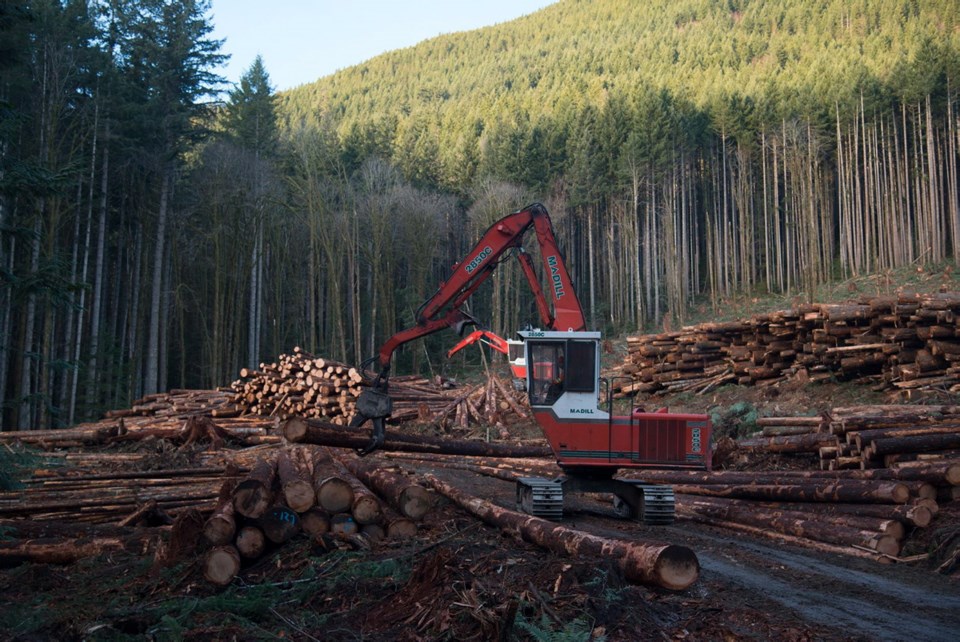VANCOUVER — The B.C. government has given away so much power to timber companies that district forest managers no longer have the authority to stop suspect harvesting practices in the public good, a Forest Practices Board report reveals.
The independent provincial watchdog says that in recent years, it has seen “situations arise where forestry development was putting local environmental and community values at risk, yet district managers could do little to affect the development and protect the public interest.”
The board adds that “conflicts between resource users could have been avoided if district managers had the authority to intervene to ensure operations would meet local management objectives and respect tenured interests.”
As the provincial officials “closest to the ground,” district managers should receive conditional discretion over the issuance of cutting permits and road permits in “specific and limited circumstances,” the board recommends.
“It would strengthen the district manager’s role in safeguarding the public interest when dealing with matters such as logging on steep slopes, cumulative effects management, visual quality, conservation of species at risk, or conflicts between tenure holders.”
The Forest and Range Practices Act is designed to give forest licensees flexibility to manage harvesting within a framework of government objectives.
The report says: “These objectives place restrictions on logging in certain locations, but licensees are free to operate elsewhere, as long as they comply” with the act and Forest Planning and Practices Regulation.
“It is licensees and their professionals who make the final decisions about how to balance resource values and minimize risks. If a problem occurs, government officials are restricted to dealing with it after the fact.”
Susan Yurkovich, president and CEO of the Council of Forest Industries, said the industry is “operating at a very high level of compliance” under the Forest and Range Practices Act and has a set of requirements and expectations against which companies are expected to perform.
She noted as an example that companies are required to maintain a minimum of 1,800 hectares of caribou habitat in the timber-
harvesting land base, but are maintaining 10 times that amount and “expect to maintain that level for the foreseeable future.”
In another report last August, the board concluded that most forest-stewardship plans governing forest activities on Crown land do not meet the public’s needs, are not enforceable by government and provide little in the way of innovative forest management.
Vivian Thomas, a spokeswoman for the Ministry of Forests, Lands, and Natural Resource Operations, said that in response to the report, the ministry will focus on communicating clear government expectations, improved language for plan objectives and improvements to measurement and verification of results and strategies. The board’s recommendation for greater power for district managers will be considered as a part of that process, she said.
The board’s findings drew immediate support from the environmental community and people who have fought against the province’s inability to stop controversial logging practices.
“Logging companies have free rein over everything,” said Pitt River Lodge owner Dan Gerak, who is fighting to stop the Teal Jones Group from logging his tourist viewscapes and the rain- forest habitat of some of the few remaining grizzlies in southwest B.C. “Somebody has to get control of these logging companies. They have way too much power.”
Teal Jones is also under fire for logging of old-growth forests in the Walbran Valley on Vancouver Island.
“District managers must be given back the right to say no,” said Joe Foy, national campaign director for the Wilderness Committee, adding that the government has stripped that right in the name of cutting red tape. “People attend public meetings thinking that their pleadings to save endangered-species habitat or a viewscape or favourite camping area will be heard and acted on by the district manager, but the people might as well be talking to a blank wall.”
Randy Saugstad, a rancher in the Chilcotin, was the subject of two Forest Practices Board reports into the impact of logging practices on the hydrology of his property. He reached an undisclosed out-of-court settlement this year with Tolko Industries.
“It should go back to where there’s government oversight,” he said at the time. “There’s no compliance and enforcement anymore. It’s just a free-for-all.”
Told of the board report, he said: “This couldn’t come at a better time as B.C. Timber Sales has now — in spite of Tolko’s settling with me — gone up Twinflower Creek and laid out a 300-hectare block to be put up for auction. I have a lawyer involved again but am not looking forward to another six-year fight, especially with the government.”
Saugstad’s 160-hectare ranch is bisected by Twinflower Creek.



